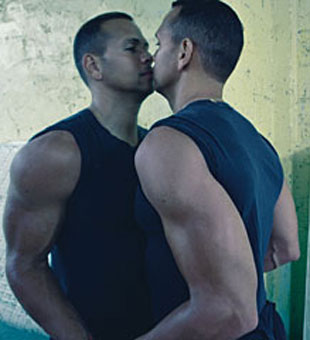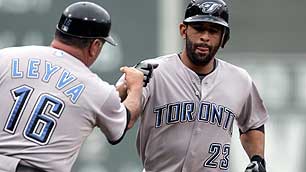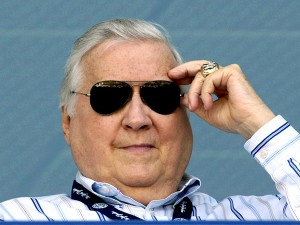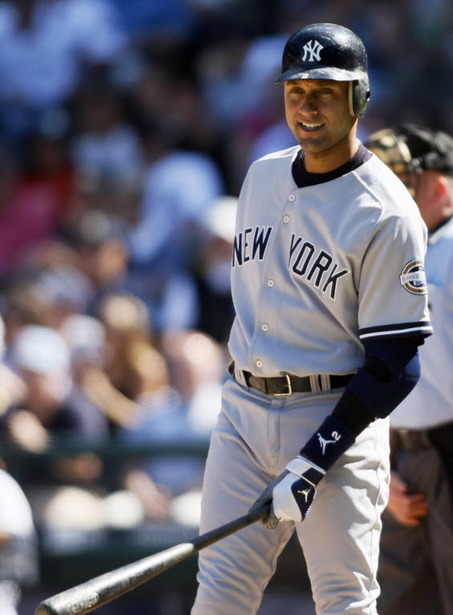George Steinbrenner will be missed
Earlier today the Associated Press reported that George Steinbrenner, the long-time owner of the New York Yankees, died at the age of 80 after suffering a massive heart attack.
Steinbrenner’s passing was confirmed by the Yankees organization, as well as his family who issued a statement.
“He was an incredible and charitable man,” the Steinbrenners said in their release. “He was a visionary and a giant in the world of sports. He took a great but struggling franchise and turned it into a champion again.”
I wholeheartedly agree with those sentiments. George Steinbrenner was the best owner in baseball, and arguably, in all of professional sports.
Consider the Yankees without the seven World Series championships (2009, 2000, 1999, 1998, 1996, 1978, 1977) they won under his direction. It’s hard to do.
That means no Mr. October, Reggie Jackson.
Derek Jeter, Mariano Rivera, Andy Pettite and Jorge Posada wouldn’t have been the Core Four of the dynasty of the late 1990s and early 2000s.
The New York Yankees, the Evil Empire as we know it, would not have existed without the leadership of the Boss.
Now some may argue that Steinbrenner’s influence damaged the game. As a season ticket holder of the Toronto Blue Jays, I can sympathize. The war of attrition with the Boston Red Sox in the American League East with both teams stockpiling arms like Cold War superpowers has basically ruined any chance of my hometown team winning a pennant.
But that’s a situation that can’t be entirely blamed on Steinbrenner. Major League Baseball made the luxury tax rules, he merely played within their bounds. I can’t say that I blame him. Any owner – any person, for that matter – should pursue success to the fullest extent of their resources.
There’s no point in hating Steinbrenner simply because he had more resources than everyone else.
I’m sure that one of my colleagues in the media is going to write a similar eulogy about how Steinbrenner is the last of a dying breed. How we’ll never see another person make such an impact as the owner of a professional sports team.
Although George Steinbrenner was a unique character, there will be more owners like him. Already in the National Basketball Association we have Mark Cuban and Mikhail Prokhorov, the owners of the Dallas Mavericks and New Jersey Nets respectively, both cast very much in the Steinbrenner mould.
No, I think that Steinbrenner serves as the prototype of what the owner of a professional sports team can be. An ideal example that other owners should model themselves after. He was one of the greats, and although his New York Yankees are often hated, his is a legacy that should be admired.
You’re bringing me down, ARod

This photo of Alex Rodriguez has nothing to do with Thursday's game against the Oakland Athletics. It's just funny.
Yesterday I tried to be sunny and say three nice things about Major League Baseball. It took less than 24 hours for Alex Rodriguez to bring me back down with his bush league play.
In case you missed it, Yahoo Sports’ Big League Stew summed it up well:
“In the sixth inning of the A's 4-2 victory, Rodriguez went from first to third on a foul ball by Robinson Cano. His trip back to first took him right over the pitcher's mound, an unspoken no-no that ticked [starting pitcher Dallas] Braden off right away.
After a double play ended the inning, the 26-year-old pitcher immediately started yelling at A-Rod — watch it here — who claimed he didn't know he had done anything wrong.”
This isn’t the first time that ARod has broken one of baseball’s unwritten codes. We’ll ignore his admitted steroid use and focus on his transgressions against the game’s etiquette.
My first exposure to Rodriguez’s classless brand of play was during the infamous 2004 American League Championship Series with his New York Yankees leading the series against the Boston Red Sox 3-0. On a routine groundout to the pitcher ARod decided to chop the ball out of Bronson Arroyo’s hand. After some deliberation the umpires ruled him out.
It became a turning point in the series with the Red Sox rallying to an improbable seven-game series victory.
Three seasons later, Rodriguez got into the same kind of shenanigans at Toronto’s Rogers Centre. During an infield fly Rodriguez, circling rounding third, yelled right behind the rookie infielder who had called for the ball. Believing that he was being called off by another Blue Jay, the fielder let the ball fall harmlessly to the ground, allowing the Yankees to score.
Asked about the incident, ARod claimed that he had only yelled in celebration.
My problem with ARod isn’t so much what he does, but how he handles the ensuing criticism. He refuses to accept responsibility.
I don’t mind there being a heel in baseball. In fact, I think it’s one of the best things about Barry Bonds’ entire career. I didn’t like the former Giants slugger, but I could at least admire his willingness to be the villain.
Instead, of Bonds’ unique sense of personal responsibility, we get Rodriguez saying this in reaction to Braden’s blow-up: “He just told me to get off his mound. I was a little surprised. I'd never quite heard that. Especially from a guy that has a handful of wins in his career ... I thought it was pretty funny actually.”
I see ARod’s flaunting of baseball’s social conventions as something akin to taking a run at a goaltender in hockey or flagrantly fouling a star player in basketball. You can do it, but don’t act surprised when they’re upset.
Don’t dismiss their complaints because you have a higher batting average or get more lucrative endorsement deals. Appreciate that if you lack respect for your opponents they’re going to disrespect you. Expect some sort of retribution and take your lumps.
Major League Baseball needs to adjust its clocks
Although I’m just 26-years-old there are times when I feel old and curmudgeonly. Recently, my complaints have been directed at Major League Baseball’s handling of “event” games, whether they are the World Series, the World Baseball Classic, the All-Star Game or Opening Day.
All of these rather significant baseball games start way too late, they’re filled with time-consuming theatrics and the play itself seems to move at an incredibly slow pace. It makes me feel like an old crank shaking his walking cane at those damn kids who won’t get off my lawn.
However, NorthJersey.com reported Thursday morning that at least two MLB umpires - Joe West and Angel Hernandez – agree with me.
The two officials are members of the crew that have been calling the opening series between the Boston Red Sox and New York Yankees.
“They’re the two clubs that don't try to pick up the pace,” said West in the article. He is the chief of the umpiring crew and was behind home plate on Sunday. “They’re two of the best teams in baseball. Why are they playing the slowest?”
“It’s pathetic and embarrassing. They take too long to play.”
Amen, Joe West. Amen.
Hernandez refused three requests for timeouts during Tuesday night’s game. New York’s Derek Jeter, Marcus Thames and Boston's David Ortiz were all denied a pause from the ‘action’.
Despite West and Hernandez’s efforts to quicken their glacial pace, the Yankees and Red Sox first two games clocked in at 3 hours and 46 minutes and 3 hours and 48 minutes.
Maybe baseball players don’t have to work the next morning, but most people do. How is baseball supposed to cultivate a new audience of young fans when any responsible parent would be sending their kids to bed hours before these games lumber to an end? How are the paying customers expected to sit through nearly four hours of slow play?
Commissioner Bud Selig must find a way to curb these seemingly interminable games. Broadcasters must be haemorrhaging viewers with these lengthy match-ups and in the long run it’s going to shrink baseball’s market share.
Selig should move the time of the game up. Both games in the New York-Boston series were slated to start at 8 p.m. Eastern Daylight Time. How about moving the opening pitch up to 7 p.m.? At least that way the game will end on the same day, barring extra innings.
That’s another thing – when I say “opening pitch”, I do mean the first throw of the game. Not a fly over by the Air Force, the unfurling of a gigantic flag in the outfield or a performance by Jay-Z and Alicia Keys. If you must have all that pageantry, start it at 6 p.m. with the game itself beginning an hour later.
I know that this would effectively cut the West Coast off, but does Selig really want to be developing Yankee and Red Sox fans in California? Shouldn’t they be cheering for the five teams they already have?
Also, the most important part of any sporting event is the final result, and the Pacific Time Zone won’t be robbed of that. A Californian baseball fan who gets off work at 5 p.m. would only be missing the first half of the game.
Major League Baseball is famous for being slow to adapt to change, but enforcing a more reasonable time frame for their games is a pressing concern that Bud Selig should address sooner rather than later. After all, the clock is ticking.


